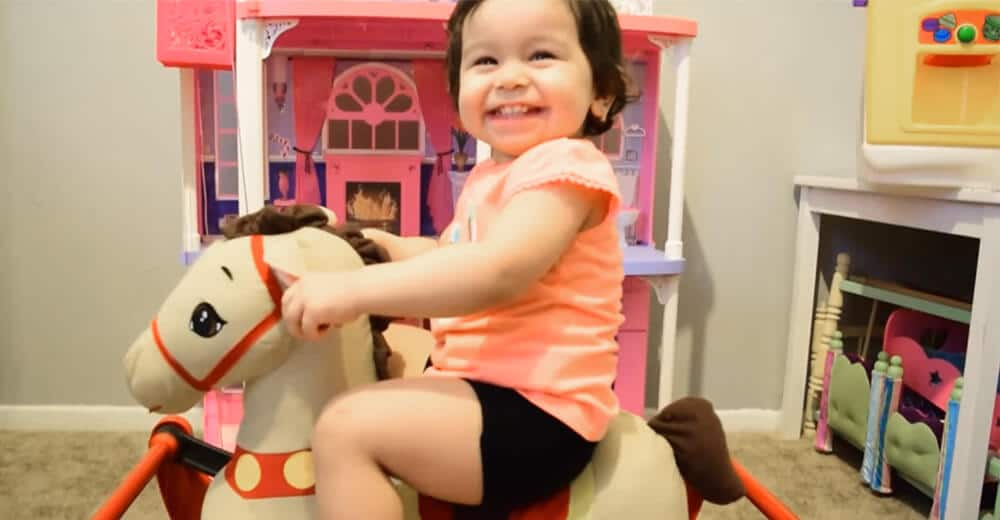How to get an overtired toddler to sleep is probably one of the most difficult issues of the parenthood. Of course, all kids are unique, and we all are in different and incomparable situations.
However, there are commons patterns that, to some extent, could be applicable to any kid in the world.
It’s a common knowledge that sleep is a vital part of a baby’s health.
I was so lucky and hardly had any problems with getting my eldest boys to sleep, but with my little princess I was uneasy for a while. She woke up every hour or two almost every second night and was not able to fall asleep for a couple of hours.
Good thing was that most of the time my baby girl was not crying and just wanted to play with me and have all my attention… I realized that the only reason for such behavior was her overtiredness. I was pretty sure about that, as she was a healthy baby and didn’t show any signs of severe illness.
It was not the easiest time for me. Truth be told, I was pretty nervous about the pressure of sorting out the situation. It took me about 3 months to deal with it. Finally, everything worked well and I breathed with relief when my little angel was able to settle in the evening and fall asleep within one – one and a half hour.
What is melatonin and how does it work?

Melatonin is a natural hormone regulating sleep-awake cycle. It’s secreted by the pineal gland within the brain in response to changes in light. Exposure to light is responsible for stimulation of a pathway from eye retina to a suprachiasmatic nucleus (SCN) in the hypothalamus and inhibition of melatonin secretion.
Therefore, during the day the pineal gland is inactive. However, when darkness occurs, the pineal gland begins to produce melatonin very actively. By around 3 months, babies start making melatonin, which puts their sleep cycle into a more regular rhythm.
I’ve been reading a lot of different articles related to toddler’s development and sleeping patterns in particular. I’ve read everything about natural production of melatonin and did my best to maximize my daughter’s secretion of this hormone.

How to maximize melatonin secretion?
- Go to bed by 10pm. Maximum production of melatonin is between 11pm and 1am, up to 80%.
- Give a toddler enough water to drink.
- Have a quite time in the bedroom: talk quietly and cuddle your little one, read him a story, rock if needed, and sing a lullaby.
- Keep the bedroom dark.
That’s easier said than done… Despite all the hours of trying to establish a certain procedure, my daughter sometimes didn’t want to go to her cot; she preferred to have a nap on her favorite chair or in her floor bed.
Quite honestly, I didn’t like it at all, and almost forced her to go to her proper bed and sleep there. But after her first temper tantrum I really felt embarrassed and helpless. Then I made my mind that nothing would happen if she fell asleep on her chair or in the floor bed and I would move her to the cot later.
I was wise in not glooming over the fact she my little princess was not falling asleep in her lovely cot. And in a few weeks, she wanted to sleep in her own cot without any problems.
Maybe your toddler is doing the same? If so, let him stay there and relax. Try to soothe him and comfort, talk quietly or sign lullabies and when he falls asleep, move him to his cot.
Has your baby have his own chair or a floor bed yet? If not, and you would like to have one of those or both, my reviews of the best chairs for toddlers and best toddlers floor beds might be of help.

Below is a short interview with the author
Noelle Weist: My main question is how to get an overtired toddler to bed
Luba Vaitkene: Not the easiest one to answer… However, my daughter has a 6-months old, not a toddler yet, but I still have some experience how to deal with babies. It’s obvious that every toddler’s sleep needs are different. Very often they easily get overtired and later we have troubles getting them to bed. How to prevent it? In the second part of the day it’s better to remove all the distractions: turn off TV, switch off mobiles, try to create a calm and quiet atmosphere. Make sure your toddler is not hungry (if he is, he simply will refuse to go to bed) and if he wants to play, try to choose quiet games or read a book.
Noelle Weist: How to prepare a toddler for sleep?
Luba Vaitkene: I believe the easiest and the most appropriate way to prepare a toddler for a sleep is to create a consistent and loving every day routine. And to do it in practical terms means to have a predictable bedtime routine: dinner followed by bath, cleaning teeth, followed by a story or two, and then into bed. As toddlers don’t know the time yet (they cannot read the clock), it’s important to help the kid to recognize routine sequence of activities. The more often he does it, the more easily he gets used to it. Of course, these things cannot be solved at one night, they take time. And as a child gets older, it could take a little bit longer.
Noelle Weist: Is it normal for a toddler to wake up at night?
Luba Vaitkene: I believe it’s pretty normal. Toddlers can still wake up at night. You can’t expect your little one to always sleep right through every single night. But if he wakes up and is not able to get back to sleep for a long time, and it’s becomes a pattern, then you need to think about it. However, if it’s just one off, that could mean that he was a bit overexcited during the day or in the evening, and there was something that he was still thinking about. The only thing you can do is just to respond to his need, and try to soothe him to sleep.
Noelle Weist: What would you do if an overtired toddler doesn’t want to sleep?
Luba Vaitkene: I would try to soothe him, rub his back or belly, rock him till he is drowsy, sign a lullaby or read him his favorite story or switch on the record he loves the most if any.
Noelle Weist: That’s sounds good to me! Thank you for your time and sharing your opinion.
Luba Vaitkene: My pleasure.
Conclusion
The best thing to avoid any troubles with getting your overtired toddler to bed is to help him to establish a routine and do your best to follow it. Stick to your normal routine, try to be as much repetitive as you can. Don’t expect the changes to happen overnight. Take one day at a time, one night at a time and you will see progress little by little.
But if you are really struggling to help your child to fall asleep at night, and it’s becoming problematic for you, you’d better get an advice of your pediatrician.
Table of Contents



Leave a Reply